|
NEVER TRUST A HIPPY
The real
Glastonbury and the missing millions
So it's nearly time for Glastonbury again. Everyone's favourite festival of wonderful music and crazy alternative-lifestyle hijinks is set to delight the nation once more, turning a small corner of rural Somerset into a rainbow utopia of superness for a few days. Indeed, according to this story on the BBC website, the festival represents "a serious beacon of light in a wicked world", according to a "Mr Roberts" who is mysteriously unidentified elsewhere in the piece. What a load of big fat hairy bollocks, eh viewers? Just for the sake of it, let's - just for once - document the reality.
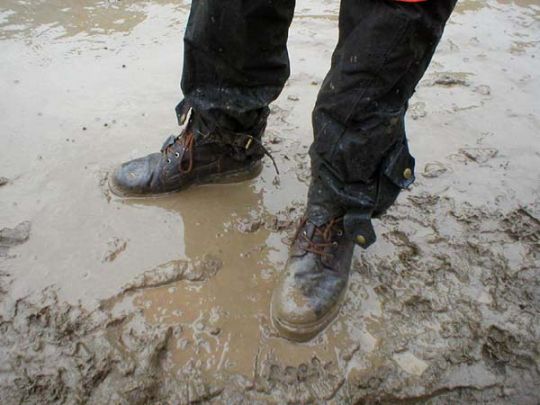
World War 1 and Glastonbury - the only recorded sites of cases of trench foot in the last century.
Now, your reporter is well known as a child of the punk-rock revolution, so in the interests of fairness let's put aside our baser prejudices for a moment here, shall we? Your intrepid correspondent did just that in 1998, deciding to set aside blind hippy-hating and actually see the festival for himself in order to come to an informed and fair opinion. You can read the rather dispiriting results of that expedition, including some insight into the carefully and lovingly-planned Glastonbury infrastructure, here.
But hey, Glastonbury isn't about basic hygiene and actually seeing any of the bands you've paid £125 to watch, is it? It's all about the soul, man. Held close to Stonehenge and the famously mystical Glastonbury Tor, on our near the Summer Solstice, the festival's about getting in touch with your inner self and the planet, feeling the touch of the Earth goddess, and realising that if we could all just love each other and live together in peace, the world would be a beautiful place and that. Yeah, man.
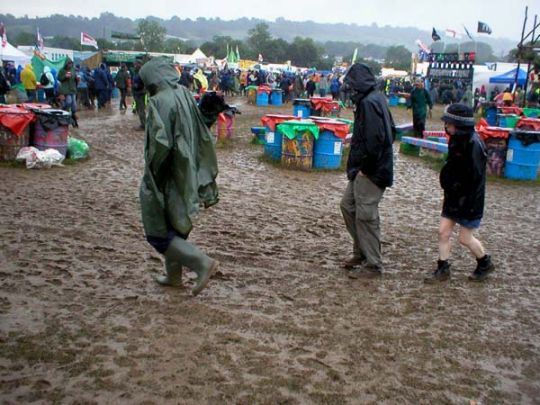
An alternative lifestyle, there. (All these pics from the 2004 festival, incidentally.)
Indeed, thousands of the people who go to Glastonbury every year will proudly tell you that they didn't see a single band. They spent that £125 (plus travel, three days of four-quid tofu burgers, vaccinations and the cost of replacing the iPods that got nicked from their tent) in order to be with ordinary people and share the novel experience of being nice to them, before returning to their normal lives and getting back to ignoring them on the tube again. (The notion that you could try being nice to people, or hang out with your friends, without forking out hundreds of pounds to sit in someone else's swampy field of filthy mud and piss apparently having escaped them.)
(It probably ought to go without saying at this point that come the revolution, anyone who's ever gone to Glastonbury and proudly announced afterwards that they didn't see a single band will be the very first up against the fucking wall. Yes, before the lawyers OR the Big Brother contestants. The stupid fucking cunts.)
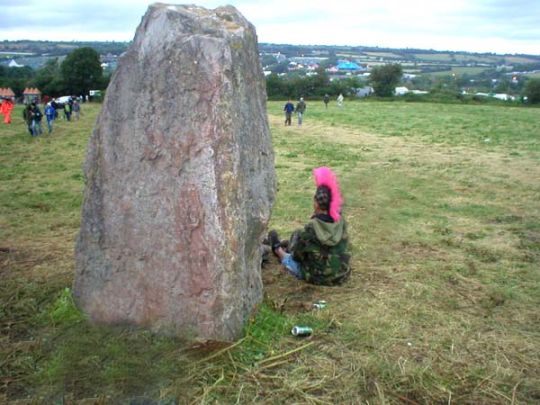
Glastonbury: "spiritual".
But hang on a minute. Let's talk about that money some more, shall we? It's often claimed by the organisers of Glastonbury that the festival ultimately makes no profits. The huge sums generated by ticket sales, merchandise concessions and corporate sponsorship allegedly only just cover the costs of putting the festival on, once you've factored in policing costs and the sizeable charitable donations made every year from the receipts. (We'll also generously overlook the fact that much of Glastonbury's charitable donations don't actually go to "charity" at all, but to political groups. Everybody loves Greenpeace, after all, and, um, let's all just forget about the CND years, shall we?)
So let's do some arithmetic. The festival in 2005 will be attended by 112,000 paying visitors, each coughing up £125 for a ticket. (In a very recent development dating back only five or six years, tickets now sell out within 24 hours of going on sale, long before details of the bill have been announced. Lucky nobody goes to see the bands, eh?) That gives us a total basic income of exactly £14 million. To this we can add the income from corporate sponsorship and renting out space to falafel stands and henna-tattoo sellers, which are not made public, but said to total between £2m and £4m. We'll take a figure halfway between, giving us a total festival income of £17 million.
Now, since there's apparently no profit, let's see if we can figure out where it all goes.
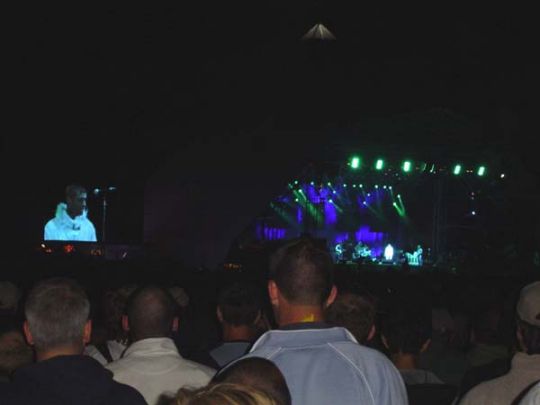
WoS stole these pictures from another site. The original caption for this one: "Oasis."
Many Glastonbury attendees are encouraged to believe that the festival's entire operating profit is donated to worthy causes. In fact, only approximately 7% of Glastonbury's income is donated to the charitable and political organisations supported by the festival. So that's about £1.2 million accounted for straight away. Then you've got the policing. Such a massive influx of largely urban visitors to a small country village like Pilton requires a huge amount of spending on police, to deal with the 30% increase in annual crime that the festival inflicts on the region during the week or so that it takes place. However, the festival only actually contributes 40% of the cost of this policing, the rest being borne by the taxpayer (that's us, chums). That adds around £750,000 to the debits column in Glastonbury's accounts, so we're now down to £15 million.
From this point, it gets rather difficult for anyone who's been to Glastonbury to start identifying any major expenditure on the part of the festival's organisers. The tasks of everyday stewarding (as opposed to policing) are undertaken by volunteers in exchange for free entry. Despite the festival occupying (it proudly boasts) more space than the city of Bath, there is no kind of transport infrastructure. There are no roads laid down, and almost nothing even in the way of gravel tracks or boarding to make routes passable in the event of rain (which, in the West of England in mid-June is always a considerable likelihood). If a couple of showers turn the site into a mudbath, visitors just have to struggle round the sodden, gluey ploughed fields as best their footwear will allow. At night, the site is almost entirely unlit and unsignposted, relying on ambient light from stages and food stalls.
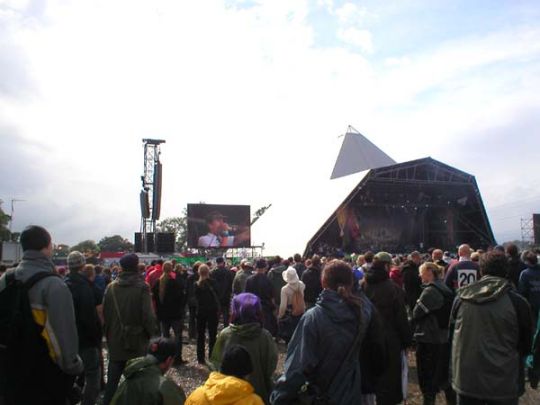
Whereas these, OBVIOUSLY, are the Lost Prophets. Much better than watching on the telly, eh?
The only other visible expense, then, is the toilets. Ah, the legendary Glastonbury toilets. Despite the festival now being in its 35th year on the same site, there are no permanent or semi-permanent toilet blocks. Toilet facilities are provided in large part by huge pits dug in the ground with uncovered benches positioned above them with holes cut in the planks, giving Glastonbury a standard of sanitation slightly lower than the average German concentration camp in World War 2. (Washing facilities are more or less non-existent, so for God's sake don't fall over in the mud.)
For those of a more sensitive hygienic disposition, there are also ranks (and your reporter uses the word advisedly) of chemical portaloos which, as far as can be ascertained, are not emptied during the six days that the festival site is open to the public. It's a fine day indeed if (and delicate readers are advised to skip straight to the next paragraph at this point) you enter one of Glastonbury's chemical toilets after the first day and find that some ignorant tosser hasn't ignored the signs and deposited a big, unflushable, undissolvable turd in it.
Mostly, of course, faced with long walks and long queues to use these primitive facilities, a very large proportion of visitors will simply go behind bushes, against wooden fences, or into streams dotted around the site, with catastrophic consequences for the local environment. ("The wildlife, where it still exists, does a general exodus. The festival creates a million gallons of raw sewage, which helps to pollute the River Whitelake", reports this website analysing the impact of the festival on the Pilton community.)
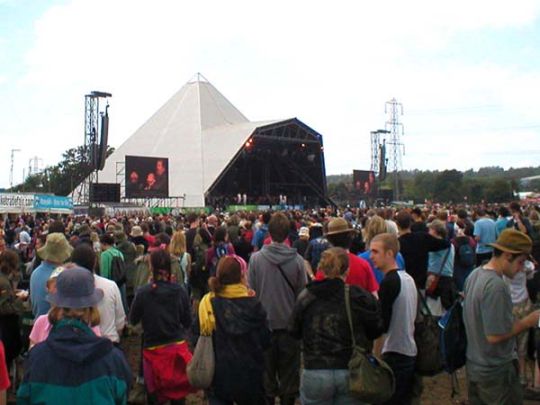
This, conversely, is the English National Opera. As any fool can tell.
But anyway, the toilets are probably the festival's major infrastructural expense. Your reporter's investigations have failed to uncover any reliable figures for the cost of hiring out chemical toilets, so we'll have to take a stab. The site linked above claims that the site slightly exceeds the obligations of its licence and features 550 metres of urinals (mostly for men), and logic would dictate a smaller number of actual toilets, so let's say 2000 individual "facilities" overall, including the charmingly-named "slurry pits". If we assume - and this seems like a wild overestimate - that each single chemical toilet, urinal space or plank with a hole in it costs on average £1,000 to hire/create for the duration of the festival, that's another £2 million spent, leaving just £13 million in the kitty.
But hey, we haven't hired any bands yet!
Obviously, it isn't cheap to hire acts of the calibre of the White Stripes, Coldplay, Oasis and, um, Basement Jaxx (2005's unconvincing replacement for the cancelled-through-illness Kylie Minogue). Except, it is if you're Glastonbury. Bands demand far lower fees to play Glastonbury than other similar festivals, on account of its "spiritual" nature. A couple of years ago, it was revealed that the most that had ever been paid to a headline act was £50,000. If we assume that that figure has increased since then (let's say to £75,000), and decrease the amounts proportionately as we move down the bill, it's just about impossible to arrive at a total figure paid to performers of more than £2 million.
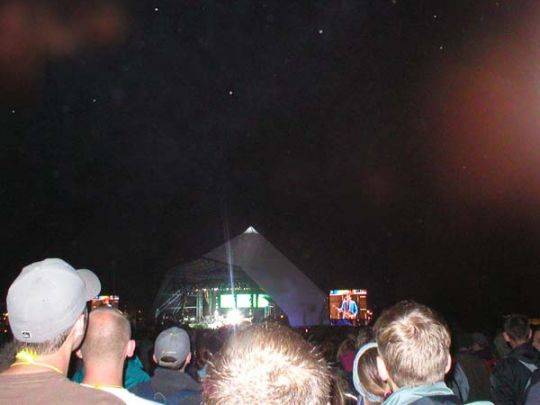
And finally, the unmistakeable Paul McCartney. (Wonder what HE charged?)
And so, with all of Glastonbury's major expenditures accounted for, even the most generous estimates of the costs involved in staging the festival leave us with a dizzying £11 million in revenues unaccounted for. (This reporter, for one, is going to be pretty interested to see the will when Michael Eavis dies.) Not a bad return for letting a load of hippies sit around in your field for a few days in conditions that the RSPCA wouldn't allow you to inflict on your cows, all while being lauded as the nation's greatest champion of counterculture, is it?
But of course, a gullible twat and his money are soon parted. If Glastonbury didn't relieve its patrons of their hard-trust-funded cash, it'd probably only get spent on Rizlas and dreamcatchers and iBooks and CDs of whale songs anyway, so it's hard to blame the organisers of Glastonbury for fleecing their visitors. They are farmers, after all.
But your correspondent is more than a little weary of all the hypocritical bullshit surrounding the whole nakedly commercial process of Glastonbury, perpetuated by people who, in many cases, really ought to know better. So let's be clear on this.
IT'S... THE WoS GLASTONBURY PERSONALITY TEST!
Award yourself one point if you've ever said any of the following (non-ironically):
|
"Well, you know, Glastonbury is just DIFFERENT to the likes of
Reading or T In The Park or Download or V2005 or all the others!"
"The toilets are just part of the atmosphere!"
"I'm only going so I can have a good time with my
friends and meet lots of wild, fun new people!"
"All the profits go to charity!"
"We didn't see a single band!"
"Gaia"
"Alternative lifestyle"
"The new series of Big Brother"
"Leylines"
"Chillout Field"
"Spliff"
|
NOW ADD UP YOUR SCORE!
|
1-2 points: You're stupid.
3-4 points: You're a cunt.
5-6 points: You're a stupid cunt.
7 points or over: You're a stupid fucking cunt.
|
Eleven million quid a year unaccounted for, folks. Enjoy yourselves, shitting into a ditch.
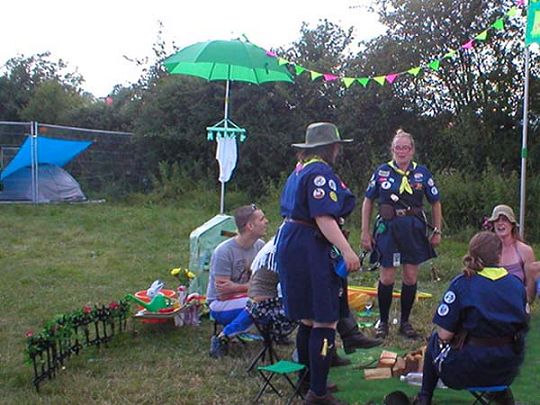
Still, you get to hang out with some KERRAYZEE people!!!
|

